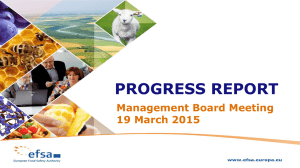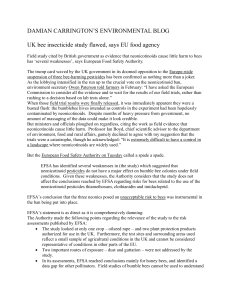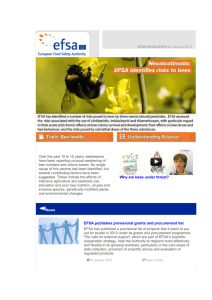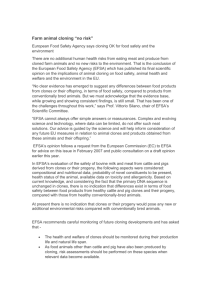PREPAREDNESS ADVISORY FORUM IN DEALING WITH
advertisement
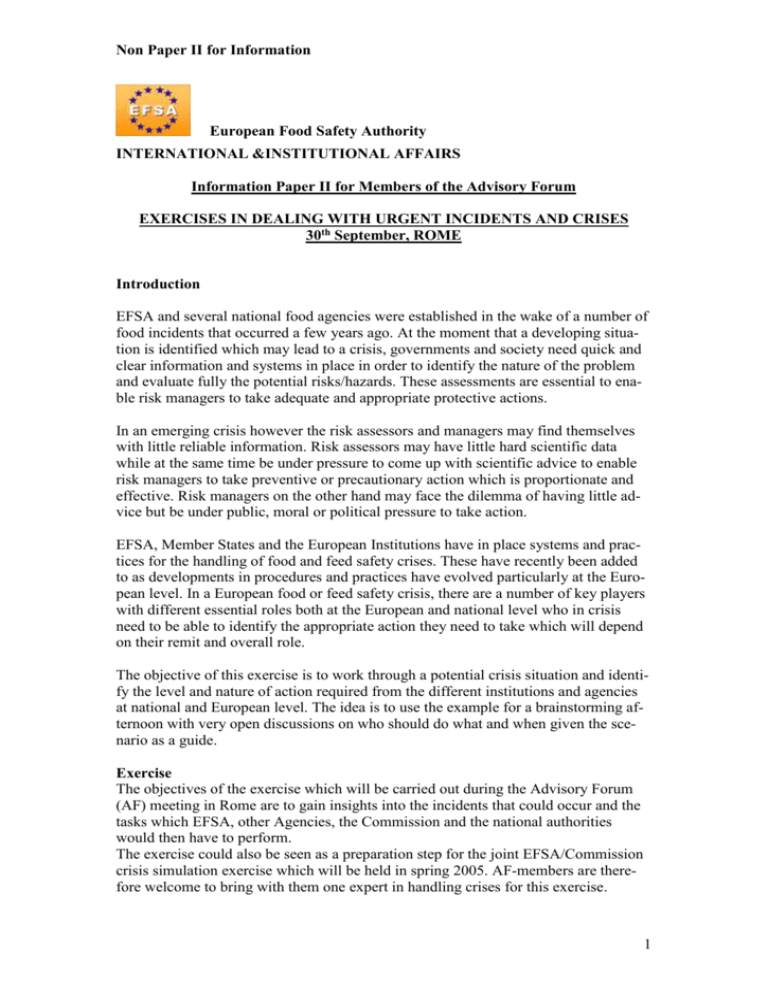
Non Paper II for Information European Food Safety Authority INTERNATIONAL &INSTITUTIONAL AFFAIRS Information Paper II for Members of the Advisory Forum EXERCISES IN DEALING WITH URGENT INCIDENTS AND CRISES 30th September, ROME Introduction EFSA and several national food agencies were established in the wake of a number of food incidents that occurred a few years ago. At the moment that a developing situation is identified which may lead to a crisis, governments and society need quick and clear information and systems in place in order to identify the nature of the problem and evaluate fully the potential risks/hazards. These assessments are essential to enable risk managers to take adequate and appropriate protective actions. In an emerging crisis however the risk assessors and managers may find themselves with little reliable information. Risk assessors may have little hard scientific data while at the same time be under pressure to come up with scientific advice to enable risk managers to take preventive or precautionary action which is proportionate and effective. Risk managers on the other hand may face the dilemma of having little advice but be under public, moral or political pressure to take action. EFSA, Member States and the European Institutions have in place systems and practices for the handling of food and feed safety crises. These have recently been added to as developments in procedures and practices have evolved particularly at the European level. In a European food or feed safety crisis, there are a number of key players with different essential roles both at the European and national level who in crisis need to be able to identify the appropriate action they need to take which will depend on their remit and overall role. The objective of this exercise is to work through a potential crisis situation and identify the level and nature of action required from the different institutions and agencies at national and European level. The idea is to use the example for a brainstorming afternoon with very open discussions on who should do what and when given the scenario as a guide. Exercise The objectives of the exercise which will be carried out during the Advisory Forum (AF) meeting in Rome are to gain insights into the incidents that could occur and the tasks which EFSA, other Agencies, the Commission and the national authorities would then have to perform. The exercise could also be seen as a preparation step for the joint EFSA/Commission crisis simulation exercise which will be held in spring 2005. AF-members are therefore welcome to bring with them one expert in handling crises for this exercise. 1 Non Paper II for Information The afternoon meeting in Rome, which shall last approximately 4 hours, will be opened with a general introduction by EFSA’s Executive Director. AF-members are already aware of ‘EFSA’s In house procedures for handling a crisis’ and the ‘General plan for food/feed crisis management (Commission Decision 2004/478/EC)’. There will be a very brief presentation on these two documents. The working languages during the meeting are: EN, FR, GE and IT. Intention A scenario has been developed for members to explore dealing with different aspects. These are summarized under the title ‘key words’. It should be noted that EFSA does not necessarily have the key role or responsibility at every stage. The discussion around the scenario should aim at: exploring a common understanding of the respective roles of EFSA, Commission and the national authorities concerned may play in crisis situations, or in a situation which may develop into a crisis; developing an understanding among participants on how these roles vary according to the nature of the issue (e.g. emerging risk vs. food safety controls issue); explore the communications processes required to support effective crisis management; help gain an understanding of the different approaches regarding the periods pre-crisis, crisis and post crisis and how these may lead to a formal declaration of crisis and other actions; explore possible obstacles that could be encountered in the development of effective working processes. Questions to help guide participants through the discussions. Some questions may seem obvious and some less so. Some will not be relevant for a particular stage in the scenario but may be for another. These questions are therefore meant to act as an aide memoire only during the exercise. Regarding the initial period. 1. What actions should be taken and by whom if an incident ‘pops up’ at regional, national or European level? 2. How should growing serious concerns in relation to an emerging risk be passed on among and between the groups of risk assessors and risk managers? 3. Which actions should be taken by the organization that gets the signals first? 4. How can the various early warning systems be used, e.g. EFSA’s emerging risk capabilities, AF networks, members MB, EFSA-net and being a network of the RASFF? Is anything new/different needed compared to existing systems? 2 Non Paper II for Information Information matters 5. If a national authority has identified a growing concern, how should it keep EFSA informed? 6. How will information concerning an emerging concern reach the relevant national and European bodies? 7. What Information does EFSA need from the national bodies, and vice versa? 8. When should the information about the incident be diffused through the Advisory Forum network? What tools should be used? What information do the national bodies need from EFSA and at which moment? 9. How should EFSA the Commission and the national authorities manage information that appears to be contradictory? 10. What if the industry holds a lot of data – how can these be accessed. What if they refuse to pass these through to EFSA? 11. When should international organisations (i.e.WHO, OIE) be involved? How can EFSA, the Commission and national authorities liaise with them? Could consumer and stakeholders organizations hold vital information? Who will contact them? 12. How is a continuing and coherent flow of information to the public ensured? Interface risk assessment and risk management 13. If risk assessors find the problem - when should the risk managers be formally informed? And vice versa? 14. At which moments is the EFSA able to deliver suitable reliable information to the Commission and MS? What should happen in the interim before it has the concrete information? 15. When should the EFSA have the initiative in examining an issue? When should this more practically be done at the national authorities? 16. What kind of information would be requested by the Commission: i.e. statements, scientific opinions, studies or other? 17. How can EFSA, the Member States and the Commission deal with situations that may rise where benefits may outweigh the risks? When the Commission declares the incident as a ‘crisis’, it will establish a Crisis Unit in which the EFSA will participate. 18. What information do national authorities want from EFSA in this case? 19. Does the Advisory Forum have a direct interaction with the Crisis Unit? 20. How can it be guaranteed that the communication officers always receive the most up-to-date information? 21. How can we avoid significant publication differences between EFSA, the Commission and the national authorities? 3 Non Paper II for Information SCENARIO Discovery of new hazard in foodstuffs Key words: emergency risk, international perspective, panic based on uncertain situation Stage 1 Researchers have reported that they have identified a potential link between a microorganism that is often found on raw chicken and a severe and widespread chronic illness in humans. Usually chicken is cooked and the micro-organism destroyed but sometimes with cross contamination it is believed that although no acute illness appears to be caused by this micro-organism, the micro-organism is still being ingested and may be responsible for this widespread chronic condition. Members of the Authority’s Panel on Biohazards are concerned. A major study trying to establish if there is a link has just be completed in the US – the report is pending - other studies with hard data have also be completed recently in several MSs. WHO has held a consultation on the matter. Its report is pending also. The early indications are that there is still uncertainty. The press is speculating that there is a problem with chicken. There is a growing concern amongst consumers that chicken may be unsafe. Stage 2 EFSA forms a working group of the Biohazard Panel. The Panel needs data. EFSA’s Panel identifies that one data set is needed to give harder evidence of a link or otherwise. EFSA commissions studies. The Commission is considering protective measures and has asked EFSA to provide some urgent help on the scientific issues. Information is emerging that the micro-organism is found mainly on chickens from three Member States but these are marketed across the EU and in third countries. The Commission is also considering whether this is a ‘Crisis’ and whether the Crisis Unit should be formed. Chicken consumption is going down in several Member States. In particular the press in one Member State has been very active on this and there are even television programmes about “killer chicken”. There are questions in the European Parliament. The poultry industry is now growing concerned that the industry is being destroyed by speculation and not hard facts and is launching a publicity campaign. Stage 3 EFSA receives the results of the studies it has commissioned. Several MS authorities have also gathered information from their various tests (chemical and microbiological) on chicken and some have national scientific groups looking at the issue. Several Member States have supplied scientific information to the Commission several to EFSA. The Commission is convening Standing Committees on a regular basis to discuss the matter. WHO is asking for information on the scientific issues surrounding this incident and the measures that are likely to be taken. Some MS have already banned the marketing of chicken from the 3 Member States implicated. Third countries are banning the importation of European chicken and products made from it from all EU countries. European consumers are now avoiding chicken from all Members States and eating beef. 4 Non Paper II for Information Stage 4 The Biohazard Panel completes its work and drafts its Opinion. The Opinion confirms in its view the micro-organism concerned found in chicken could be responsible for the severe chronic disease. The Commission and the Member States consider what they will do with this new Opinion. 5
